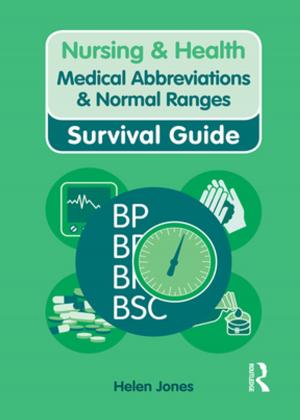Building Out into the Dark
Theory and Observation in Science and Psychoanalysis
Nonfiction, Health & Well Being, Psychology, Psychoanalysis, Mental Health| Author: | Robert Caper | ISBN: | 9781317723523 |
| Publisher: | Taylor and Francis | Publication: | December 16, 2013 |
| Imprint: | Routledge | Language: | English |
| Author: | Robert Caper |
| ISBN: | 9781317723523 |
| Publisher: | Taylor and Francis |
| Publication: | December 16, 2013 |
| Imprint: | Routledge |
| Language: | English |
In this book, Robert Caper provides the reader with an introduction to psychoanalysis focusing explicitly on whether psychoanalysis is part of the sciences, and if not, where it belongs.
Many psychoanalysts, beginning with Freud, have considered their discipline a science. In this book, Caper examines this claim and investigates the relationship of theory to observation in both philosophy and the experimental sciences and explores how these observations differ from those made in psychoanalytic interpretation. Building Out into the Dark also explores topics including:
- the origins of psychoanalysis in the art of medicine
- the therapeutic effect of psychoanalysis
- the archaic superego
- psychoanalysis with the individual and groups
- what makes psychoanalytic work unique.
Building Out into the Dark offers a thoughtful consideration of the nature of psychoanalytic knowledge and how it is gained. The book's accessible and concise style makes it a useful introductory resource for students studying psychoanalysis, for psychotherapists who are curious about the distinction between psychoanalysis and other forms of therapy as well as those interested in placing psychoanalysis in the context of current cultural and intellectual developments.
In this book, Robert Caper provides the reader with an introduction to psychoanalysis focusing explicitly on whether psychoanalysis is part of the sciences, and if not, where it belongs.
Many psychoanalysts, beginning with Freud, have considered their discipline a science. In this book, Caper examines this claim and investigates the relationship of theory to observation in both philosophy and the experimental sciences and explores how these observations differ from those made in psychoanalytic interpretation. Building Out into the Dark also explores topics including:
- the origins of psychoanalysis in the art of medicine
- the therapeutic effect of psychoanalysis
- the archaic superego
- psychoanalysis with the individual and groups
- what makes psychoanalytic work unique.
Building Out into the Dark offers a thoughtful consideration of the nature of psychoanalytic knowledge and how it is gained. The book's accessible and concise style makes it a useful introductory resource for students studying psychoanalysis, for psychotherapists who are curious about the distinction between psychoanalysis and other forms of therapy as well as those interested in placing psychoanalysis in the context of current cultural and intellectual developments.















